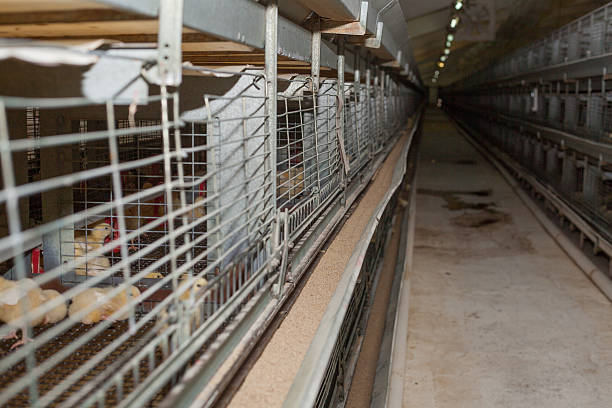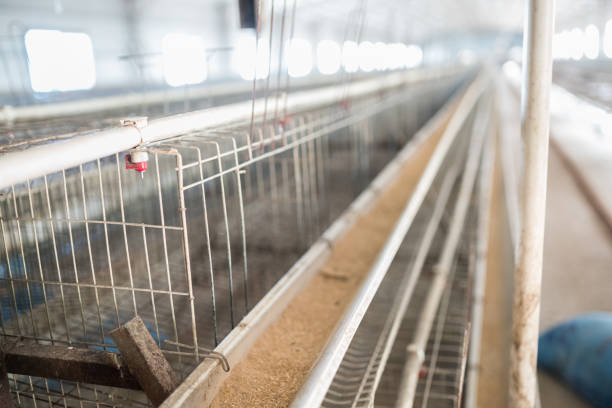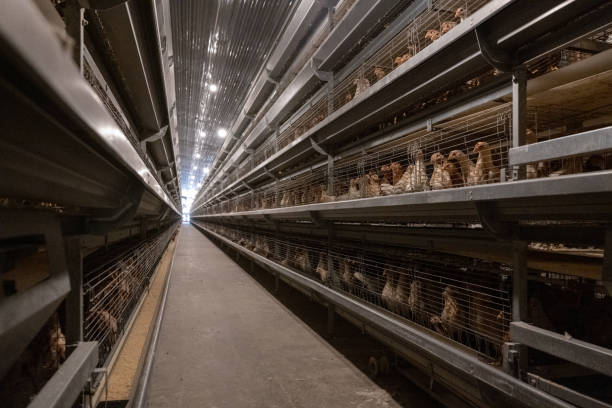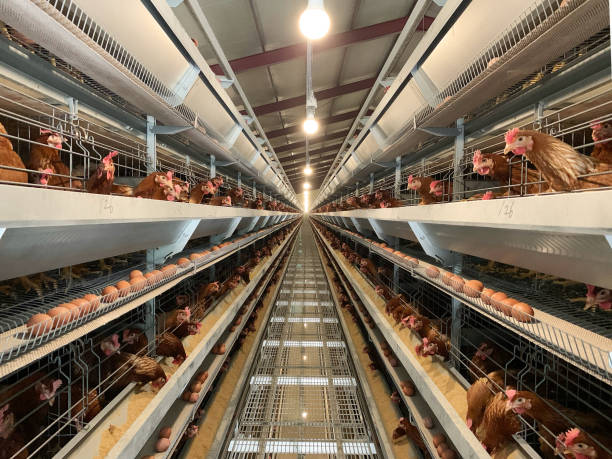
Invest in Success: Durable & Cost-Effective Chicken Farming Cage Systems for Sale – Built for Africa
Invest in Success: Durable & Cost-Effective Chicken Farming Cage Systems for Sale – Built for Africa
Chicken farming in Africa presents a significant opportunity for economic growth, food security, and community development. However, success hinges on adopting efficient and sustainable farming practices. Among these, the choice of housing system plays a crucial role. Durable and cost-effective chicken farming cage systems, specifically designed and manufactured for the African context, offer a compelling solution for both smallholder farmers and large-scale poultry operations. This article explores the benefits of investing in such systems and highlights key considerations for making the right choice.

The Rise of Cage Systems in African Poultry Farming
Traditional free-range chicken farming, while appealing, often faces limitations in terms of land availability, biosecurity, and productivity. Cage systems, on the other hand, offer a controlled environment, optimizing resource utilization, reducing disease outbreaks, and increasing egg or meat production. The increased density of birds in a cage system also necessitates careful attention to ventilation, waste management, and overall animal welfare. Therefore, selecting a system built for the specific conditions of Africa is paramount.
Key Benefits of Investing in Durable & Cost-Effective Chicken Farming Cage Systems
Investing in well-designed cage systems yields a multitude of benefits for African poultry farmers:
Increased Productivity: Cage systems optimize space utilization, allowing for a higher density of birds per square meter compared to free-range or deep litter systems. This translates to increased egg or meat production, maximizing your return on investment. Furthermore, the reduced energy exertion of the chickens in cages allow them to use more of their nutritional intake for egg laying and meat production.
Improved Biosecurity: Enclosed cage environments minimize contact with wild birds, rodents, and other potential disease carriers. This reduces the risk of disease outbreaks, leading to healthier flocks and reduced mortality rates. It also reduces the need for medications, saving you money and offering a more natural, healthy option for your chickens.
Enhanced Feed Efficiency: Cage systems allow for precise feed management, minimizing wastage and ensuring that each bird receives the optimal amount of nutrition. This reduces feed costs, which constitute a significant portion of the overall operating expenses in poultry farming.
Easier Management & Monitoring: Cages facilitate easier monitoring of individual birds, allowing farmers to quickly identify and address any health issues or behavioral problems. This leads to improved bird welfare and reduced losses.
Reduced Labor Costs: Automated cage systems, equipped with features like automatic feeding, watering, and egg collection, significantly reduce labor requirements. This is particularly beneficial in regions where labor costs are high or labor availability is limited.
Improved Egg Quality: For egg-laying operations, cage systems often result in cleaner, more consistent eggs, as the eggs are rolled away from the birds, minimizing contamination.
Protection from Predators: Cages offer protection from predators such as wild animals and stray dogs or cats, which can be a significant problem for free-range farms.
Features to Look for in Chicken Farming Cage Systems Built for Africa

When selecting a chicken farming cage system for your African poultry operation, consider the following features:
Durable Construction Materials: The cages should be constructed from high-quality, galvanized steel or other corrosion-resistant materials to withstand the harsh environmental conditions prevalent in many parts of Africa, including high humidity, extreme temperatures, and exposure to corrosive substances.
Proper Ventilation: Adequate ventilation is crucial for maintaining air quality, reducing ammonia levels, and preventing respiratory diseases. Look for cage systems with well-designed ventilation systems or the ability to be easily integrated with existing ventilation infrastructure.
Efficient Waste Management: Effective waste management is essential for maintaining hygiene, reducing odor, and preventing the spread of disease. Consider cage systems with built-in manure removal systems or designs that facilitate easy cleaning and disinfection.
Appropriate Cage Size & Design: The cage size and design should be appropriate for the breed and age of the birds being housed. Ensure that the cages provide adequate space for the birds to move comfortably, feed, and drink. The construction materials should also be easy to clean and disinfect.
Easy Access to Feed & Water: The cage system should provide easy access to feed and water for all birds. Automatic feeding and watering systems can further improve efficiency and reduce labor costs.
Egg Collection Mechanism (for layer cages): Consider the egg collection mechanism and ensure that it minimizes egg breakage and contamination. Automatic egg collection systems can significantly reduce labor costs and improve egg quality.
Climate Control Features: For regions with extreme temperatures, consider cage systems with integrated climate control features, such as cooling pads or heating elements, to maintain a comfortable environment for the birds.
Types of Chicken Farming Cage Systems
Several types of chicken farming cage systems are available on the market, each with its own advantages and disadvantages. The choice of system will depend on your specific needs and budget:
Layer Cages (for egg production): These cages are designed specifically for laying hens and typically feature sloped floors that allow eggs to roll forward for easy collection. They may also include automated feeding and watering systems. These systems have made a huge impact on the accessibility of quality eggs around the globe
Broiler Cages (for meat production): Broiler cages are designed for meat chickens and are typically larger than layer cages to accommodate the rapid growth of the birds. They should provide adequate space for the birds to move and access feed and water.
Battery Cages: Battery cages are a type of layer cage that houses multiple hens in a small space. While they offer high stocking densities, they have been criticized for their potential impact on animal welfare.
A-Frame Cages: A-Frame cages are a popular choice for small-scale farmers. They are relatively inexpensive and easy to assemble, and they provide good ventilation and access to feed and water.
H-Frame Cages: H-Frame cages are a more advanced type of cage system that offers improved ventilation, waste management, and egg collection. They are typically used in larger-scale operations.
Cost-Effectiveness Considerations
While investing in durable and well-designed cage systems may require a higher initial investment, the long-term cost-effectiveness should be considered. Factors to consider include:
Reduced Feed Costs: Efficient feed management in cage systems can significantly reduce feed costs, which constitute a major portion of the overall operating expenses.
Reduced Labor Costs: Automated cage systems can significantly reduce labor requirements, saving you money on wages and benefits.
Increased Productivity: Higher egg or meat production in cage systems translates to increased revenue and faster return on investment.
Reduced Disease Outbreaks: Improved biosecurity in cage systems reduces the risk of disease outbreaks, saving you money on medication and veterinary care.
Longer Lifespan: Durable cage systems constructed from high-quality materials will last longer, reducing the need for frequent replacements.
Selecting the Right Supplier
Choosing the right supplier is crucial for ensuring the quality and performance of your chicken farming cage system. Look for a supplier with:
Experience in the African Market: The supplier should have experience in providing cage systems to African poultry farmers and should be familiar with the specific challenges and requirements of the region.
High-Quality Products: The supplier should offer cage systems constructed from durable materials and manufactured to high standards.
Competitive Pricing: The supplier should offer competitive pricing without compromising on quality or performance.
Excellent Customer Service: The supplier should provide excellent customer service, including installation support, training, and after-sales support.
Warranty: The supplier should offer a warranty on their cage systems to protect you against defects in materials or workmanship.
Installation and Maintenance
Proper installation and maintenance are essential for ensuring the longevity and performance of your chicken farming cage system. Follow the manufacturer’s instructions carefully during installation and establish a regular maintenance schedule to address any potential problems. Regular cleaning, disinfection, and lubrication of moving parts will help to extend the lifespan of your cage system and ensure optimal performance.
Sustainability and Animal Welfare Considerations
While cage systems offer numerous benefits, it is important to consider the sustainability and animal welfare implications. Choose cage systems that provide adequate space for the birds to move comfortably, express natural behaviors, and access feed and water easily. Proper ventilation, waste management, and climate control are also essential for maintaining a healthy and comfortable environment for the birds. Consider enriching the environment to allow the chickens to express their natural behaviors.
Conclusion

Investing in durable and cost-effective chicken farming cage systems built for Africa is a strategic decision that can significantly improve the productivity, efficiency, and profitability of your poultry operation. By carefully considering the features, types, and cost-effectiveness of different cage systems, and by selecting a reputable supplier, you can ensure that you are making a sound investment that will yield long-term benefits. Remember to prioritize sustainability and animal welfare in your decision-making process to create a responsible and ethical poultry farming operation. With the right cage system in place, you can contribute to food security, economic growth, and community development in Africa. The implementation of a high-quality cage system allows farm owners to take advantage of the growing demand for poultry products, leading to significant returns and a stable, thriving business.
